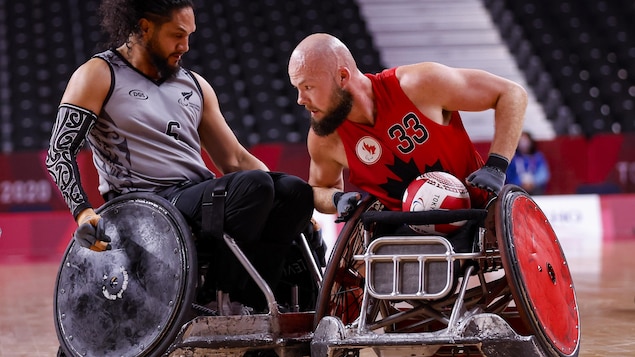A few days before his departure for Europe, head coach Patrick Côté spoke about various topics related to his sport. He’s been around since 2002 and has managed the Maple Leaf since 2011. He’s seen it, games and he’s seen rugby evolve a lot over the last 20 years.
Great competition for Canada
The World Championship will be the biggest competition since the Tokyo Paralympic Games. Canada were favorites for a medal there. The Canadian players lost their first two encounters and failed to qualify for the semifinals.
When it came time to reflect on the Japanese experience at home, one thing stood out again: the team hadn’t played enough games, weren’t ready to face the Paralympic pressures and were struggling to keep a close game after the to cope with others.
Now that travel is possible, the Canadians will have played almost 40 games by the end of the competition in Denmark.We’ve played many games against the best teams in the world, says Côté. We had tight games, we won tight games and we lost tight games. It means the team has really gained confidence and it means they are confident and ready to tackle this competition.
. Plus, all players are back for another Paralympic cycle. Canada will have an experienced team on site.
More parity
In the past, medals at world championships were a matter for Australia, the USA, Canada or Japan. For the first time, seven nations can hope for the podium.
Paralympic champion Great Britain, European champion France and host country Denmark can compete with the other four powers.Most games will be extremely close. It will all come down to one or two mistakes, says Coté. There is very little wiggle room. If we look at the schedule of the competition, circling the important games and those where we were able to rest our best players, we’re still talking about eight games in six days; but the reality is that there will be no easy game.
In addition to Australia, Canada meets Japan, Colombia, Brazil and Denmark in the round robin. Only good news, for the first time there will be quarterfinals, which will reduce the importance of winning all games.
Sport development
To score in wheelchair rugby, you have to cross the baseline with the ball. The sport is notorious for violent contact between wheelchairs.
Originally, it was reserved exclusively for tetraplegics. To ensure some balance between teams, the sport is governed by a classification system.
Each athlete is given a score between 0.5 and 3.5 depending on their handicap level, and the four players on the court can achieve a maximum total score of 8.
Over the past decade, changes in eligibility criteria have allowed athletes with amputations or cerebral palsy to play. The sport has become faster as a result and we see a lot less passes.
It all comes down to the acceleration players have with the ball, Côté says. It becomes a positional game, you have to be able to position your opponent relatively quickly with your chair. If you’re able to be in a good position, you can get your opponent in trouble. Everyone has a physical limitation of the upper limbs so there is still a margin of error with any ball manipulation.
The goal of the exercise is to force the opponent to let go of the ball, creating a turnover and regaining possession.
Reconciliation with World Rugby
The Paralympic movement is gaining credibility and we therefore see that the various international federations are becoming increasingly interested in sport for athletes with functional disabilities.
World Rugby, the international governing body that notably organizes the Rugby World Cup, is no exception.
It is the sport’s most recognized and profitable competition. She has already started discussions with the International Wheelchair Rugby Federation in order to achieve greater cooperation between the two organisations. These talks could lead to major changes in the international Paralympic sporting calendar.
The dream is maybe having our World Cup in year 3 of a Paralympic cycle instead of year 2 aligned with the Rugby World Cup
says Cote.
This would benefit wheelchair rugby from the visibility of the World Cup.
The Paralympic Games will remain the major event for wheelchair rugby, at least in the medium term. The qualifying process for this competition remains unclear as the World Championships take place in the third year of the cycle. It will be necessary to keep teams interested throughout the four years of the cycle, even if they don’t qualify for the major events.
The international association will also be holding a congress in Denmark and this project will certainly be on the agenda and it will be very interesting to see what comes of it.

Incurable food practitioner. Tv lover. Award-winning social media maven. Internet guru. Travel aficionado.





;Composite=(type=URL,url=https://images.radio-canada.ca/v1/assets/elements/16x9/outdated-content-2013.png),gravity=SouthEast,placement=Over,location=(0,0),scale=1)

